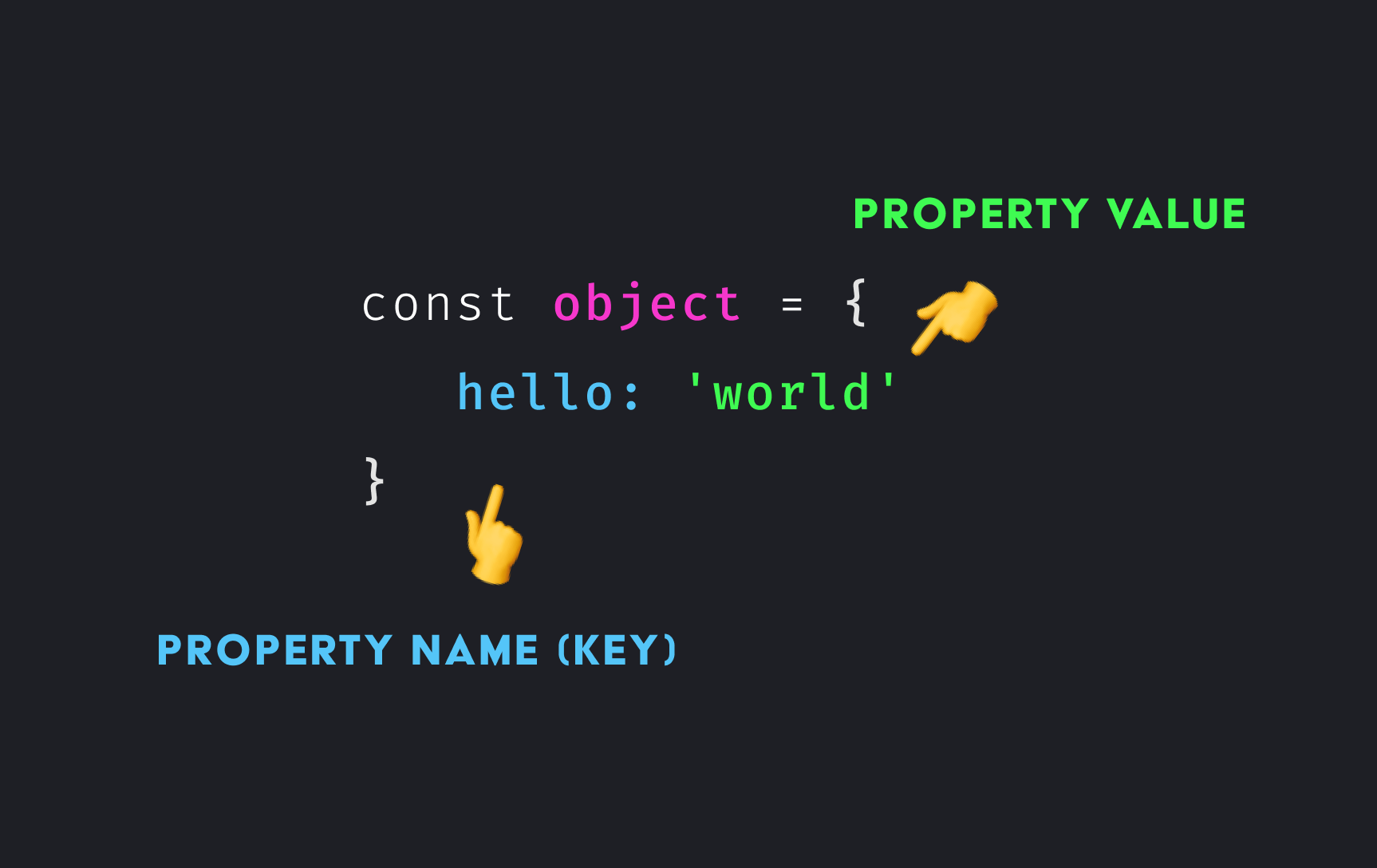🧱 Objects
Everything you need to know about the JavaScript Object
The JavaScript object is a collection of key-value pairs, similar to a map, dictionary, or hash-table in other programming languages. Anything that is not a JS primitive is an Object.
- An Object is a collection of properties.
- A Property is a key-value pair that contains a name and a value.
- A Property Name is a unique value that can be coerced to a string that points to a value.
- A Property Value can be any value, including other objects or functions, that associated with the name/key.

Object Basics
Creation
Create an empty object. You have several options.
// literal
const dog = { }
// constructor
const cat = new Object();
// static method
const horse = Object.create({ })
Get and Set Properties
Now that we have an empty object, we need to add properties to it using accessors.
Valid property names include anything that can be coerced to a string, but must not used reserved words like function, var, return and so on.
get = object.property;
object.property = set;
A potential gotcha with dot notation is that you can only access names that follow variable name identifier conventions, i.e without spaces or that do not start with a digit.
obj['hi mom'] = 1;
obj[23] = 1;
// syntax errors
obj.hi mom
obj.23
Since ES6, we have a convenient shorthand for setting properties:
let hello;
let world;
// Old way 💩
const obj = {
hello: hello,
world: world
}
// Modern way 👍
const obj = {
hello,
world,
}
Use a variable or expression as a property name by wrapping it in brackets - this is called a computed property.
const x = 'howdy';
const obj = {
[x]: 23
}
obj.howdy // 23
Object properties can be removed with the delete keyword.
delete obj.hello;
delete obj.world;
References
An object is stored in the heap memory, which means variables maintain a reference to it, as opposed to a full copy of it. When checking for object equality, it checks the reference - not the actual value of properties.
const original = { }
const x = original;
const y = original;
x === y; // true
x === {}; // false
Any variable that points to that reference can set its properties and they will be shared between all variables.
x.hello = 'world';
original.hello; // world
y.hello; // world
Combine Objects
But what if we want to clone an object to create a separate reference? Object.assign allows us to copy an object’s properties and create a new reference. Its properties will be copied to the new object, thus changes to the original object will not affect the clone.
const original = {
hello: 'world'
}
const clone = Object.assign({ }, original);
clone === original; // false
original.hello = 'changed!';
clone.hello; // world (did not change)
Spread Syntax
A more concise alternative to Object.assign is the spread syntax.
const clone = Object.assign({ }, original);
const sugar = { ...original };
const sugar = { ...original, hola: 'mundo' };
Object Methods
When a function is assigned to an object, it is called a method.
Shorthand
const obj = {
hello() {
console.log('yo')
}
}
obj.hello();
This
In a normal method, this refers to the object on which it is defined.
const obj = {
username: 'Jeff',
hello() {
console.log(`My name is ${this.username}`)
}
}
obj.hello(); // My name is Jeff
Arrow
Functions using the arrow syntax are not bound to this, so it refers to the outer or global this context.
const obj = {
username: 'Jeff',
hello: () => console.log(this.username)
}
obj.hello(); // My name is undefined
Chaining
In certain JS libraries you will see method chaining with obj.doThis().toThat(), which is made possible by simply returning the value of this from each method.
const game = {
hitpoints: 100,
log() {
console.log(`👾 ${this.hitpoints}`);
},
takeDamage() {
this.hitpoints -= 10;
this.log();
return this; // Required for chaining
},
heal() {
this.hitpoints += 10;
this.log();
return this; // Required for chaining
},
}
game.takeDamage().takeDamage().takeDamage().heal();
👾 90
👾 80
👾 70
👾 80
Constructors
Constructors are just functions that describe how to create an Object.
function Boat(name) {
this.name = name;
this.created = Date.now()
this.horn = function () {
console.log(this.name)
}
}
The object is then instantiated with the new keyword.
const sally = new Boat('Sally');
const molly = new Boat('Molly');
sally.horn() // Sally